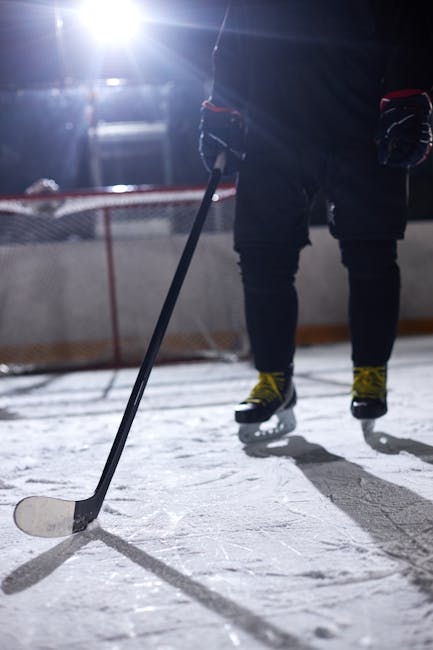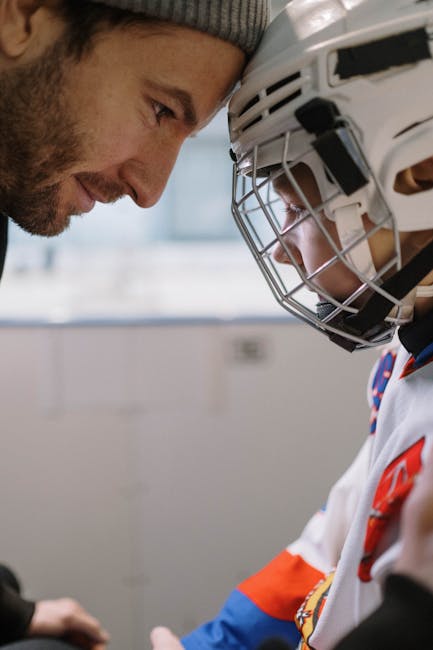Hockey Ref: The Unsung Heroes of the Ice – A Comprehensive Guide to Officiating
The Demanding Role of a Hockey Referee
The roar of the crowd, the clash of skates, the lightning-fast puck – these are the hallmarks of a hockey game. But behind the exhilarating action lies a crucial element often overlooked: the referees. These unsung heroes, clad in black and white, are the guardians of the rules, the arbiters of fairness, and the individuals responsible for maintaining order and ensuring a smooth-flowing game. Their job is far more demanding than it initially appears, requiring a unique blend of physical fitness, mental acuity, and unwavering composure under immense pressure. This comprehensive guide delves into the multifaceted world of hockey refereeing, exploring the skills, challenges, and rewards associated with this critical role.

Physical Demands and Fitness Requirements
Being a hockey referee is not for the faint of heart. It’s a physically demanding profession requiring exceptional stamina, agility, and speed. Referees must be able to skate swiftly and effortlessly for extended periods, often covering vast distances on the ice. They need the quickness to keep up with the puck’s relentless movement and the agility to avoid collisions with players. Strength and endurance are also vital, enabling them to maintain their focus and decision-making abilities throughout the game’s duration. Regular physical training, including cardiovascular exercise, strength training, and ice skating drills, is essential for maintaining peak performance and preventing injuries.

Mastering the Rules and Regulations
A profound understanding of the rules of hockey is paramount for any referee. The rulebook is extensive and complex, covering everything from icing and offsides to penalties and fighting. Referees need to possess an impeccable grasp of these rules, able to apply them consistently and fairly in the heat of the moment. This necessitates continuous learning and study, often involving regular review of rule updates and interpretation guidance. The ability to swiftly and accurately assess situations, make sound judgments, and deliver consistent calls is the hallmark of a skilled referee.
Developing the Crucial Skill of Observation
A hockey referee’s role transcends simply applying the rules; it’s about observing the game’s intricacies and anticipating potential infractions. They must possess exceptional observational skills, able to monitor the action from multiple angles simultaneously. This involves tracking the puck, players’ positions, and potential points of conflict. Referees need to develop the ability to discern subtle infractions that might escape the notice of less observant officials. Developing this highly refined skill takes practice, experience, and a keen awareness of the game’s nuances.
Maintaining Impartiality and Objectivity
Impartiality is a cornerstone of effective refereeing. Referees must be able to make objective calls, free from bias towards any particular team or player. Maintaining composure and objectivity, especially in highly charged situations, is crucial. Coaches, players, and fans can exert immense pressure, and a referee must remain steadfast in their decisions. The ability to remain calm, professional, and unbiased despite external pressures is a testament to a referee’s character and competence. Fairness is paramount, ensuring a level playing field for all involved.
Communication and Conflict Resolution
Effective communication is vital in refereeing. Referees must be able to communicate clearly and concisely with players, coaches, and linesmen, explaining their calls and managing conflicts that might arise. Their communication must be respectful yet firm, upholding authority without provoking unnecessary confrontations. Conflict resolution skills are essential in diffusing tense situations and ensuring the smooth continuation of the game. A skilled referee can skillfully navigate tense moments, using their communication skills to prevent escalations and maintain order.
The Path to Becoming a Hockey Referee
Aspiring hockey referees typically start by participating in officiating clinics and training programs offered by their local hockey associations. These programs provide comprehensive instruction in the rules, officiating techniques, and practical on-ice experience. Referees progress through different levels, starting with youth leagues and gradually advancing to more senior levels, honing their skills and gaining experience with each step. Continuous learning and development are crucial, involving ongoing training, mentorship, and feedback from experienced officials.
The Importance of Mentorship and Continuous Learning
Mentorship plays a vital role in the development of hockey referees. Experienced referees provide guidance, support, and feedback to newer officials, helping them learn from their mistakes and refine their skills. This mentorship fosters a supportive environment where officials can learn from one another and improve their officiating. Continuous learning is paramount; referees need to stay updated with rule changes, officiating techniques, and best practices. Attending workshops, seminars, and reviewing game footage are essential components of ongoing professional development.
The Rewards of Being a Hockey Referee
Despite the challenges, the rewards of being a hockey referee are significant. The sense of accomplishment that comes from contributing to a fair and well-run game is immense. Referees gain valuable skills, including communication, decision-making, and conflict resolution, transferable to many aspects of life. The camaraderie among officials is strong, fostering a sense of community and shared purpose. For many, the thrill of being part of the game, experiencing its intensity firsthand, is a source of immense satisfaction.
Different Levels of Hockey Refereeing
The hockey refereeing world encompasses various levels, from youth leagues to professional organizations like the NHL. Each level presents unique challenges and demands. Youth leagues often require a focus on player development and teaching the rules, while professional leagues demand a high level of officiating expertise and the ability to handle high-pressure situations. The level of physical fitness and game knowledge required also increases as referees progress through the ranks.
Equipment and Safety Considerations
Hockey referees wear specialized equipment to protect themselves from potential injuries. This typically includes protective padding, helmets, and shin guards. The equipment’s quality and fit are crucial, ensuring both protection and comfort. Referees must be aware of potential safety hazards on the ice and take precautions to minimize the risk of injury. Maintaining awareness of their surroundings, adhering to safe officiating practices, and being equipped appropriately are crucial for safeguarding their well-being.
Dealing with Player and Coach Behavior
A significant aspect of refereeing involves managing player and coach behavior. Referees need to handle unruly conduct, enforce penalties, and address instances of unsportsmanlike behavior. They must maintain a professional demeanor while enforcing the rules, ensuring fairness and respecting the integrity of the game. A balanced approach, combining firmness with fairness, is crucial in managing challenging interactions and maintaining order.
Technology’s Role in Hockey Officiating
Technology plays an increasingly important role in hockey officiating. Video replays and instant reviews allow referees to review controversial calls, ensuring accuracy and fairness. These technological advancements enhance the officiating process, minimizing errors and promoting consistency. Understanding how to utilize these technologies effectively and integrate them into decision-making is essential for modern hockey referees.
The Future of Hockey Refereeing
The future of hockey refereeing likely involves continued technological integration, focusing on accuracy, consistency, and fairness. Training programs will likely incorporate advanced technologies and analytical tools to enhance referee development and decision-making. The emphasis on continuous learning, professional development, and utilizing technology effectively will define the future of this demanding yet rewarding profession.







